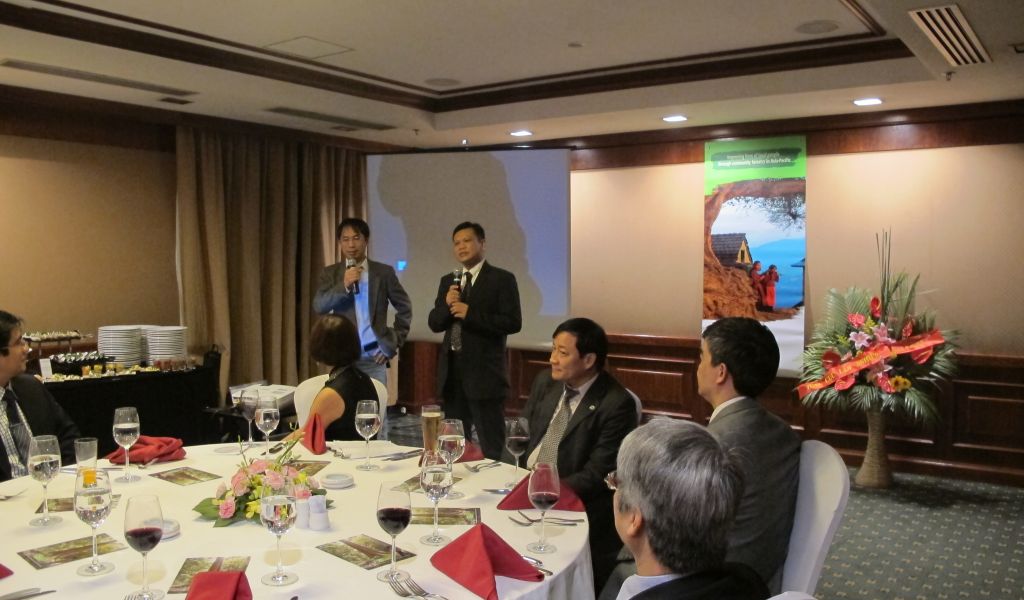Silver Jubilee Reflections at the 8th Global Forest Governance Learning Event

RECOFTC’s Manager of Communications, Marketing, and Fundraising, Prabha Chandran, reflects on the importance of good forest governance and RECOFTC’s role in supporting it over the last 25 years. With inputs from Dzung Nguyen. These reflections were part of RECOFTC’s jubilee event where lessons on various governance challenges were addressed by participants from seven African and three Asian countries. RECOFTC's role as a capacity building organization and learning center was highlighted in addressing challenges ranging from corruption and forest crime to ensuring tenure rights by building capacity at all levels.
Hue, Vietnam, 28 March, 2012: “No forests without rights, organization, and capacity” – the mission of the Forest Governance Learning Group (FGLG), which opened its 8th global learning event in Hue, Vietnam, yesterday, has never been more relevant. First, because forest management is now at the heart of international efforts to provide resources for a world of 7 billion people while addressing critical climate change challenges. Second, and more importantly, the issue of governance itself is fueling global unrest, be it on the Arab street, in the Occupy Wall Street protests, or as reflected by citizen’s crusades against corruption and crime. And forest and natural resource governance should be a bigger part of this global discourse.
So why should forest governance matter? It’s easy to overlook the obvious: properly governed forests can contribute significantly to the national GDP if used sustainably, while providing a host of invaluable environmental, social, cultural and other benefits. It’s a lesson the host country for this FGLG Learning Event, Vietnam, has internalized quite quickly. While the national goal just a few years ago was to provide 2% of GDP from the forest sector, “we are now getting some 5-7% of our annual GDP from the forest sector,” said Ms. Nguyen Truong Van, Deputy Director General of VNFOREST and a Board member of RECOFTC – The Center for People and Forests, which is the national convener for FGLG in Vietnam.
Not surprisingly, Vietnam is the only country in Asia, other than China, to be a net gainer of forestland as a result of an active reforestation program. A target of adding five million hectares of forest is on track, despite growing pressure from population growth estimated at between 80 and 100 million by 2020. Vietnam’s own impressive development trajectory – which has made it a middle income country by World Bank standards in two generations – adds it own demands on the country’s natural resources. Interestingly, Vietnam has emerged as a leading exporter of furniture, paper, and pulp, which it partly manages through imports of wood from Indonesia and other countries in the region.
Addressing the plenary at FGLG, Ms. Van emphasized the high degree of climate vulnerability conferred by Vietnam’s long coastline and the importance of forests in combating this. In a tribute to mark RECOFTC’s silver jubilee, she said: “RECOFTC has changed the framework of forest governance in Vietnam from governance based on government to governance based on local community. Many people are taught about forests at university but, at RECOFTC, they learn skills to work with people.” Thanking the organization for training over 1000 forestry officials and national partners over the last ten years, she said: “RECOFTC is one of the leading organizations in this field in Vietnam in terms of training and policy analysis.”
With delegates from ten countries (three from Asia and seven from Africa) attending the FGLG, a panel of judges graded the performance of each member country in terms of innovation and impact. FGLG Vietnam has been coordinating forest protection activities with the Hue University of Agriculture and Forestry for years, and the Rector, Dr. Nguyen Minh Hieu, who hosted the opening ceremony, remarked on the many lessons learned that have been shared from the field and rued the time it took to get these reflected in the university’s curriculum. Nevertheless, RECOFTC continues to share experiences and research with Hue University, increasingly the resources available in the field of climate change and REDD+.
RECOFTC’s Vietnam country coordinator, Dr. Nguyen Quang Tan, reported that FGLG’s work in three provinces in the country included research on how forest resources are used, how governance can be improved, and the importance of raising awareness on rights, climate, and REDD – the three being interlinked. The day closed with IIED’s James Mayers congratulating RECOFTC on the clarity of its mission and the impressive track record of practical work and services provided, including its contribution to both FGLG and IIED’s own institutional development.
But perhaps the most interesting reminiscences came from Ngoc Binh, the first Vietnamese board member of RECOFTC, who recalled how the idea for the training center came from Kasetsart University, Thailand. “In 1987, Thailand and other countries decided to set up a center, and in early 1988, seven countries together built the RECOFTC’s charter. In the end of 1988, the charter was officially signed by Vietnam.” It’s a long and close relationship, one in which RECOFTC’s role in raising the profile of community forestry has been appreciated by the host government.

